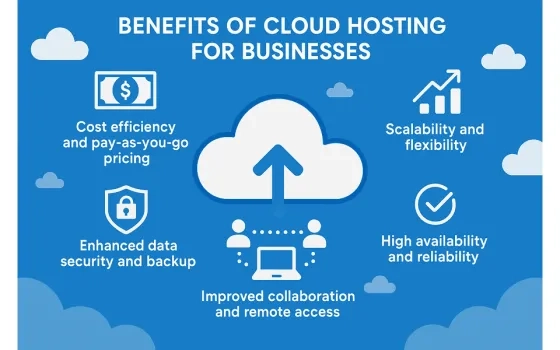In today's digital age, businesses are continually looking for ways to enhance efficiency, reduce costs, and increase flexibility. One of the most effective solutions to achieve these goals is cloud hosting. But what exactly is cloud hosting, and why is it so beneficial for businesses? In this article, we'll delve into the key advantages of cloud hosting, focusing on how it can transform your business operations.
Cloud hosting is a service that allows businesses to store and access data and applications over the internet instead of on a physical server. It leverages the power of cloud computing, providing on-demand access to computing resources, such as storage, processing power, and applications, without the need for significant upfront investment in hardware.
Understanding Cloud Hosting Infrastructure
At its core, cloud hosting utilizes a network of virtual servers that pull their resources from underlying physical servers. This network can span multiple locations, providing redundancy and ensuring high availability. Businesses no longer need to rely solely on a single physical server, which can be a point of failure. Instead, data and applications are distributed across multiple servers, enhancing reliability and performance.
Types of Cloud Hosting: Public, Private, and Hybrid
Cloud hosting comes in various forms, primarily categorized into public, private, and hybrid clouds. Public cloud hosting uses shared resources and is managed by third-party providers, offering cost-effective solutions for businesses. Private cloud hosting, on the other hand, dedicates resources to a single organization, providing enhanced security and control. Hybrid cloud hosting combines both public and private clouds, allowing businesses to take advantage of both models, optimizing performance and cost.
The Evolution of Cloud Hosting
The concept of cloud hosting has evolved significantly over the years. Initially, businesses relied on traditional on-premise servers, which required substantial investment and maintenance. As technology advanced, virtualization paved the way for cloud hosting, offering a more flexible and scalable solution. Today, cloud hosting continues to evolve, with new technologies like edge computing and serverless architecture further enhancing its capabilities.
Key Benefits of Cloud Hosting
Cost Efficiency
One of the most compelling benefits of cloud hosting is its cost-effectiveness. Traditional hosting requires businesses to invest heavily in physical servers, maintenance, and energy costs. In contrast, cloud hosting allows companies to pay only for the resources they use, often resulting in significant savings.
Moreover, the absence of physical infrastructure reduces maintenance costs and the need for technical staff. This pay-as-you-go model is particularly beneficial for small and medium-sized businesses looking to optimize their IT budgets.
Reduced Capital Expenditure
Cloud hosting eliminates the need for large upfront investments in hardware and infrastructure. Businesses can avoid the costs associated with purchasing, maintaining, and upgrading servers. This reduction in capital expenditure frees up financial resources that can be allocated to other critical areas, such as research and development or marketing efforts.
Operational Cost Savings
Beyond capital savings, cloud hosting reduces operational costs. With cloud providers handling server maintenance, businesses can minimize expenses related to IT staff and physical infrastructure management. Additionally, energy costs are reduced as companies no longer need to power and cool extensive server rooms, contributing to overall cost savings.
Economies of Scale
Cloud hosting providers operate large-scale data centers, allowing them to achieve economies of scale that individual businesses cannot. These providers can offer lower prices for computing resources due to their ability to optimize operations across a vast network of clients. Businesses benefit from these cost efficiencies, accessing advanced technology at a fraction of the cost.
Scalability and Flexibility
Cloud hosting offers unparalleled scalability and flexibility. As your business grows, your hosting needs will change. With cloud hosting, you can easily scale up or down your resources based on demand without the need for major infrastructure changes.
This scalability ensures that you can handle increases in traffic or data storage needs effortlessly. Whether you're launching a new product or experiencing seasonal spikes in traffic, cloud hosting can accommodate your needs without interruption.
Dynamic Resource Allocation
One of the key advantages of cloud hosting is its ability to allocate resources dynamically. Businesses can adjust their computing power, storage, and bandwidth in real-time, responding to changing needs without any disruption. This dynamic allocation allows for seamless scaling, ensuring optimal performance during peak times.
Supporting Business Expansion
Cloud hosting supports business expansion by providing the necessary infrastructure to accommodate growth. As companies enter new markets or expand their operations, they can quickly provision additional resources to support increased demand. This agility allows businesses to seize new opportunities without being constrained by their IT capabilities.
Customization and Flexibility
Cloud hosting solutions offer a high degree of customization, allowing businesses to tailor their infrastructure to meet specific needs. Companies can choose from a range of services and configurations, ensuring that their cloud environment aligns with their operational requirements. This flexibility supports innovation and enables businesses to implement new technologies rapidly.
Improved Collaboration
Cloud hosting enhances collaboration among team members by providing access to data and applications from anywhere, at any time. Employees can work remotely or from different locations without any hindrance, fostering a more productive and flexible work environment.
This accessibility is particularly beneficial in today's global business landscape, where remote work is becoming increasingly common. Cloud-based collaboration tools enable real-time communication and file-sharing, ensuring teams stay connected and productive.
Real-Time Collaboration Tools
Cloud hosting provides access to a wide array of real-time collaboration tools, such as document sharing platforms, video conferencing, and project management applications. These tools facilitate seamless communication and coordination among team members, regardless of their physical location, enhancing efficiency and productivity.
Remote Work Enablement
The cloud's inherent mobility supports remote work by providing employees with access to essential data and applications from any internet-connected device. This capability empowers teams to work from anywhere, supporting flexible work arrangements and reducing reliance on physical office spaces.
Bridging Global Teams
For businesses with a global presence, cloud hosting bridges the gap between geographically dispersed teams. Cloud-based solutions enable employees from different regions to collaborate effectively, sharing insights and resources in real-time. This global connectivity fosters innovation and drives business growth by leveraging diverse perspectives.
Enhanced Security
Security is a top priority for businesses, and cloud hosting providers invest heavily in advanced security measures to protect data. These providers offer robust security features such as data encryption, firewalls, and regular security audits to safeguard sensitive information.
Additionally, cloud hosting provides automatic data backups and disaster recovery solutions, ensuring that your data is safe and can be quickly restored in case of any unforeseen events. This level of security is often more comprehensive than what most businesses can achieve on their own.
Advanced Security Protocols
Cloud hosting providers implement advanced security protocols to protect client data. These protocols include multi-factor authentication, intrusion detection systems, and network segmentation, ensuring that data remains secure from unauthorized access and cyber threats.
Compliance and Regulatory Standards
Cloud providers often comply with stringent industry standards and regulations, such as GDPR, HIPAA, and PCI DSS. These compliance measures ensure that businesses meet legal requirements for data protection, reducing the risk of fines and reputational damage associated with non-compliance.
Data Redundancy and Recovery
Cloud hosting solutions offer data redundancy and recovery options to protect against data loss. Providers maintain multiple copies of data across different locations, ensuring that information can be recovered quickly in the event of a hardware failure or disaster. This redundancy provides peace of mind, knowing that critical business data is secure and accessible.
Accessibility and Mobility
With cloud hosting, businesses gain unparalleled access to their data and applications from any device with an internet connection. This mobility enables employees to work on-the-go, increasing productivity and responsiveness to business needs.
For businesses with a mobile workforce or those expanding into new markets, this accessibility ensures that employees can access critical information and applications wherever they are, without being tethered to a physical office.
Device-Agnostic Access
Cloud hosting supports device-agnostic access, allowing employees to connect to their work environment from desktops, laptops, tablets, or smartphones. This versatility ensures that team members have the tools they need to perform their roles effectively, regardless of their preferred device.
Supporting a Mobile Workforce
As the workforce becomes increasingly mobile, cloud hosting provides the infrastructure necessary to support employees on the move. Whether attending off-site meetings, working from home, or traveling for business, employees can remain productive and connected to their teams and resources.
Expanding Market Reach
Cloud hosting facilitates business expansion into new markets by providing the infrastructure needed to support operations in different regions. With cloud-based solutions, businesses can quickly establish a presence in new locations, accessing local resources and serving customers without the need for physical infrastructure.
Environmentally Friendly
Cloud hosting is also an environmentally friendly option. By using shared data centers and resources, cloud hosting reduces the carbon footprint associated with traditional hosting. This model allows for more efficient use of resources, reducing energy consumption and waste.
For businesses committed to sustainability, cloud hosting provides a means to reduce their environmental impact while still benefiting from advanced technology.
Energy Efficiency
Cloud providers operate large-scale data centers optimized for energy efficiency. These facilities utilize cutting-edge cooling systems and renewable energy sources to minimize environmental impact. By consolidating resources, cloud hosting reduces the overall energy consumption compared to individual on-premise servers.
Reducing E-Waste
Cloud hosting contributes to reducing electronic waste by eliminating the need for businesses to frequently upgrade or dispose of outdated hardware. By leveraging shared infrastructure, companies can extend the lifecycle of their technology assets, reducing the environmental burden associated with electronic waste disposal.
Supporting Corporate Sustainability Goals
For businesses focused on sustainability, cloud hosting aligns with corporate social responsibility goals. By adopting cloud solutions, companies can demonstrate their commitment to reducing their environmental footprint and contribute to a more sustainable future.
How Cloud Hosting Supports Business Growth
Supporting Innovation
Cloud hosting empowers businesses to innovate by providing access to cutting-edge technologies without the need for significant capital investment. Businesses can experiment with new applications, services, and solutions, driving innovation and growth.
The cloud environment supports rapid deployment and testing, allowing businesses to bring new products and services to market faster and more efficiently.
Access to Advanced Technologies
Cloud hosting provides businesses with access to the latest technologies, such as artificial intelligence, machine learning, and big data analytics. These tools enable companies to drive innovation, improve customer experiences, and develop new revenue streams, staying ahead of industry trends.
Accelerating Time-to-Market
The cloud's flexible infrastructure accelerates time-to-market for new products and services. Businesses can quickly deploy and test applications in the cloud, reducing development cycles and gaining a competitive edge by delivering solutions to customers faster than their competitors.
Fostering a Culture of Experimentation
Cloud hosting encourages a culture of experimentation by providing a risk-free environment for testing new ideas. Businesses can rapidly prototype and iterate on concepts without the financial constraints of traditional infrastructure, fostering creativity and driving innovation.
Competitive Advantage
By leveraging cloud hosting, businesses can gain a competitive advantage. The ability to scale resources quickly, enhance collaboration, and access the latest technologies gives businesses the flexibility to adapt to changing market conditions and customer demands.
This agility is crucial in today's fast-paced business environment, where staying ahead of the competition requires quick decision-making and the ability to pivot strategies as needed.
Responding to Market Changes
Cloud hosting enables businesses to respond rapidly to changing market conditions. By scaling resources up or down based on demand, companies can adjust their operations to align with customer needs, gaining a competitive edge by being agile and responsive.
Enhancing Customer Experiences
Cloud-based solutions enhance customer experiences by providing businesses with the tools to deliver personalized and timely interactions. With access to real-time data and analytics, companies can tailor their offerings to meet customer expectations, improving satisfaction and loyalty.
Leveraging Cloud Ecosystems
Cloud hosting provides access to a vast ecosystem of partners, tools, and services. Businesses can leverage this ecosystem to integrate with complementary solutions, enhancing their offerings and delivering value-added services that differentiate them from competitors.
Streamlining Operations
Cloud hosting streamlines business operations by automating routine tasks and simplifying complex processes. With cloud-based solutions, businesses can integrate various functions, such as accounting, customer relationship management, and inventory management, into a single platform.
This integration reduces the time and effort required to manage different systems and improves overall operational efficiency.
Automating Routine Tasks
Cloud hosting supports automation by providing tools and platforms that streamline repetitive tasks. Businesses can automate processes such as data entry, reporting, and customer service, reducing manual workloads and allowing employees to focus on more strategic initiatives.
Simplifying IT Management
Cloud hosting simplifies IT management by centralizing infrastructure and applications in a single environment. This centralization reduces the complexity of managing multiple systems, making it easier for IT teams to monitor performance, implement updates, and ensure security compliance.
Enhancing Data Integration
Cloud-based solutions facilitate seamless data integration across different business functions. By consolidating data into a unified platform, companies can gain valuable insights into their operations, enabling informed decision-making and driving efficiency improvements.
Choosing the Right Cloud Hosting Provider
Selecting the right cloud hosting provider is crucial for maximizing the benefits of cloud hosting. When evaluating providers, consider the following factors:
- Reliability and Uptime: Ensure the provider offers high uptime guarantees and reliable services.
- Security Measures: Look for providers with robust security protocols and compliance with industry standards.
- Scalability Options: Choose a provider that can accommodate your business's growth and changing needs.
- Customer Support: Opt for providers offering 24/7 customer support to assist with any issues.
Evaluating Provider Reputation
Research potential cloud hosting providers by evaluating their reputation in the industry. Look for customer reviews, case studies, and testimonials to gauge their reliability and performance. A provider with a strong track record of delivering quality services is more likely to meet your business needs.
Assessing Technical Expertise
Ensure the provider has the technical expertise to support your specific requirements. Evaluate their experience in managing cloud environments and their ability to offer tailored solutions that align with your business objectives. Providers with a deep understanding of your industry can offer valuable insights and support.
Understanding Service Level Agreements
Review the provider's service level agreements (SLAs) to understand their commitments regarding uptime, support, and performance. SLAs should clearly define the provider's responsibilities, ensuring that your business receives the level of service required to operate effectively and efficiently.
Conclusion
Cloud hosting is a powerful tool for businesses seeking to enhance efficiency, reduce costs, and drive growth. With its cost-effective model, scalability, enhanced security, and improved collaboration capabilities, cloud hosting offers numerous benefits that can transform business operations.
By choosing the right cloud hosting provider and leveraging its advantages, businesses can stay competitive, innovate, and achieve their growth objectives. In today's digital landscape, cloud hosting is not just an option; it's a strategic necessity for forward-thinking businesses.



















